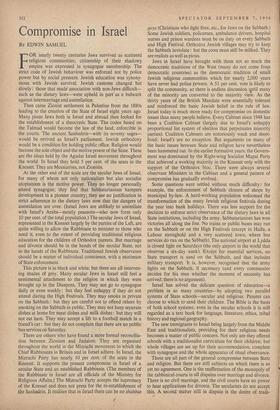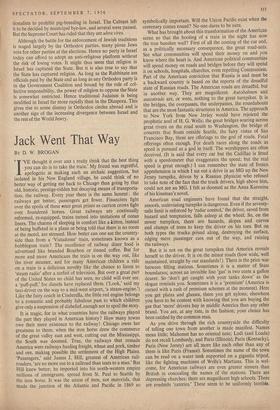Compromise in Israel
BY EDWIN SAMUEL IFOR nearly twenty centuries Jews survived as scattered religious communities; citizenship of their shadowy empire was expressed in synagogue membership. The strict code of Jewish behaviour was enforced not by police power but by social pressure. Jewish education was synony- mous with Jewish survival. Jewish customs changed but slowly : those that made association with non-Jews difficult— such as the dietary laws—were upheld in part as a bulwark against intermarriage and assimilation.
Then came Zionist settlement in Palestine from the 1880s leading to the creation of the State of Israel eight years ago. Many pious Jews both in Israel and abroad then looked for the establishment of a theocratic State. The codes based on the Talmud would become the law of the land, enforcible in the courts. The ancient Sanhedrin—with its seventy sages— would be revived as Israel's parliament. Jewish orthodoxy would be a condition for holding public office. Religion would become the sole object and the motive power of the State. These are the ideas held by the Agudat Israel movement throughout the world. In Israel they hold 5 per cent. of the seats in the Knesset. They are Messianists, not Zionists.
At the other end of the scale are the secular Jews of Israel, for many of whom not only nationalism but also socialist utopianism is the motive power. They no longer personally attend synagogue; they find that Sabbatarianism hampers development in a pioneer country; they see no justification in strict adherence to the dietary laws now that the dangers of assimilation are over. (Israel Jews are unlikely to assimilate with Israel's Arabs—mostly peasants—who now form only 10 per cent. of the total population.) The secular Jews of Israel, represented in the Knesset largely by the parties of the Left, are quite willing to allow the Rabbinate to minister to those who need it, even to the extent of providing traditional religious education for the children of Orthodox parents. But marriage and divorce should be in the hands of the secular State, not in the hands of the Rabbinate. Traditional Jewish observance should be a matter of individual conscience, with a minimum of State enforcement.
This picture is in black and white, but there are all interven- ing shades of grey. Many secular Jews in Israel still feel a sentimental attachment to the religion in which they were brought up in the Diaspora. They may not go to synagogue daily or even weekly : but they feel unhappy if they do not attend during the High Festivals. They may smoke in private on the Sabbath : but they are careful not to offend others by smoking on the Sabbath in public. They may not keep separate dishes at home for meat dishes and milk dishes : but they will not eat ham. They may accept a lift to a football match in a friend's car : but they do not complain that there are no public bus services on Saturday.
There are others who have found a more formal reconcilia- tion between Zionism and Judaism. They are organised throughout the world in the Mizrachi movement to which the Chief Rabbinates in Britain and in Israel adhere. In Israel, the Mizrachi Party has nearly. 10 per cent. of the seats in the Knesset. It supports the present compromise in Israel of a secular State and an established Rabbinate. (The members of the Rabbinate in Israel are all officials of the Ministry for Religious Affairs.) The Mizrachi Party accepts the supremacy of the Knesset and does not press for the re-establishment of the Sanhedrin. It realises that in Israel there can be no shabbas goys (Christians who light fires, etc., for Jews on the Sabbath.) Some Jewish soldiers, policemen, ambulance drivers, hospital nurses and prison wardens must be on duty on every Sabbath and High Festival. Orthodox Jewish villages may try to keep the Sabbath inviolate : but the cows must still be milked. They are realists as well as pious.
Jews in Israel have brought with them not so much the democratic traditions of the West (many do not come from democratic countries) as the democratic tradition of small Jewish religious communities which for nearly 2,000 years have never had police powers. A 51 per cent. vote is likely to split the community, so there is endless discussion intil many of the minority are converted to the majority view. As the thirty years of the British Mandate were essentially tolerant and reinforced the basic Jewish belief in the rule of law, :Israel today is much more ready for compromise on domestic issues than many people believe. Every Cabinet since 1948 has been a Coalition Cabinet (largely due to Israel's unhappy proportional list system of election that perpetuates minority parties). Coalition Cabinets are notoriously weak and short- lived; Israel's are no exception. But arguments on many of the basic issues between State and religion have nevertheless been hammered out. In the earlier formative years, the Govern- ment was dominated by the Right-wing Socialist Mapai Party that achieved a working majority in the Knesset only with the support of the Orthodox bloc. There were always several observant Ministers in the Cabinet and a general pattern of compromise has gradually evolved.
Some questions were settled without much difficulty : for example, the enforcement of Sabbath closure of shops by municipal by-law. A hard-working population welcomed the transformation of the many Jewish religious festivals during the year into bank holidays. There was less support for the decision to enforce strict observance of the dietary laws in all State institutions, including the army. Sabbatarianism has won victories all along the line. No trains or public buses may run on the Sabbath or on the High Festivals (except in Haifa, a Labour stronghold and a very scattered town, where bus services do run on the Sabbath). The national airport at Lydda is closed tight on Saturdays (the only airport in the world that observes a six-day week). Except for essential services, no State transport is used on the Sabbath, and that includes military transport. It is, however, recognised that the army tights on the Sabbath, if necessary (and every commander decides for his men whether the moment of necessity has arrived; there is no argument).
Israel has solved the delicate question of education—a problem in so many countries—by adopting two parallel systems of State schools—secular and religious. Parents can choose to which to send their children. The Bible is the basis of both school systems; even in the secular schools it is still regarded as a text book for language, literature, ethics, tribal history and regional geography.
The new immigrants to Israel being largely from the Middle East and traditionalists, providing for their religious needs becomes a matter of public concern. Not only are they offered schools with a traditionalist curriculum for their children; but whole villages are set up for their accommodation, complete with synagogue and the whole apparatus of ritual observance.
These are all part of the general compromise between State and religion. But there are still subjects on which there is as yet no agreement. One is the reaffirmation of the monopoly of the rabbinical courts in all disputes over marriage and divorce. There is no civil marriage, and the civil courts have no power to hear applications for divorce. The secularists do not accept this. A second matter still in dispute is the desire of tradi- tionalists to prohibit pig-breeding in Israel. The Cabinet left it to be decided by municipal bye-law, and several were passed. But the Supreme Court has ruled that they are ultra vires.
Although the battle for the enforcement of Jewish traditions is waged largely by the Orthodox parties, many pious Jews vote for other parties at the elections. Hence no party in Israel today can afford to adopt an anti-religious platform without the risk of losing votes. It might thus seem that religion in Israel has captured the State. But it is also true to say that the State has captured religion. As long as the Rabbinate are officials paid by the State and as long as any Orthodox party is in the Government Coalition and bound by the rule of col- lective responsibility, the power of religion to oppose the `State is somewhat restricted. Hence traditional Judaism is being modified in Israel far more rapidly than in the Diaspora. This gives rise to some dismay in Orthodox circles abroad and is another sign of the increasing divergence between Israel and the rest of the World Jewry.



































 Previous page
Previous page